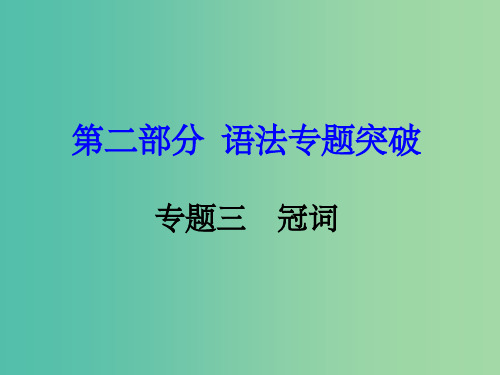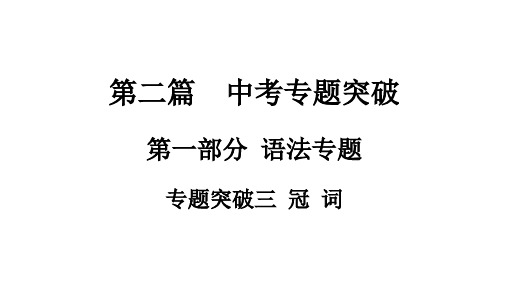中考语法突破03冠词
- 格式:docx
- 大小:25.43 KB
- 文档页数:5





2023年中考英语语法知识专项突破—冠词【知识突破】1、冠词分类及读法:英语中冠词有不定冠词和定冠词两种,常放在名词的前面,用来限定名词的意义,起泛指或特指的作用。
2、不定冠词a / an的用法:不定冠词a / an用在单数名词的前面,a用在辅音开头的词前面; an用在元音开头的词的前面。
不定冠词的基本用法:(1)表示某一个人或东西,但不具体说明何人或何物。
如:There is a dog lying on the ground.(有一只狗躺在地上。
)(2)表示某类人或事物,以区别于其他种类。
如:A elephant is much stronger than a man.(大象比人强壮多了。
)(不能译为:一头大象比一个人强壮。
)(3)表示某类人或事物中的任何一个。
如:He is a teacher of English.(他是英语教师。
)(4)表示“一”这个数量。
如:There is a table and four chairs in that dining-room.(在那个餐厅里有一张桌子和四把椅子。
)(5)几个用不定冠词的习语:a bit(一点), a little(一点), a few(几个), a lot (许多), a kind of(一种), a pairof(一副、一双), a number of(大量的), a piece of (一张、一片), half an hour(半小时), have a good time(玩得开心), have a cold(感冒), make a noise(发出嘈杂声), have/take a (rest等)(休息)一会儿,等等。
3、定冠词the的用法:定冠词the用在可数名词的单数或复数或不可数的名词前面。
(1)表示特指的人或事物。
如:The man with a flower in his hand is Jack..(手上拿着一朵花的男人是杰克)(2)指谈话双方都熟悉的人或事物。

专题三冠词重难点精讲考点精讲不定冠词a/an的用法区别不定冠词a(an)是“一个”的意思。
a用在以辅音音素开头的单数可数名词或字母之前,an 用在以元音音素开头的单数可数名词或字母之前。
经常在考题中出现的有:A a an apple/an artist/an aunt/an Asian country/an American girlE e a European country/an egg/an eight-year-old boy/an eleven-year-old boyI I an idea/an interesting storyO o a one-eyed wolf/an orange/an old man/an outgoing girlU u a useful book/a university student/a UFO/a usual storyan umbrella/an ugly man/an uncle/an unusual story/an unhappy smile特别记不规则:an hour / an honest man以元音音素开头的字母:“a, e, f, h, i, l, m, n, o, r, s, x”定冠词the的用法(1)用于谈话双方都清楚的名词前,表示特指。
如:Tom, come into the classroom please. 汤姆,请进教室。
(2)用于再次被提到的名词前。
如:There is a book on the desk. 桌上有一本书。
The book is mine. 那本书是我的。
(3)和一些名词连用,表示类别。
如:The light bulb was invented by Edison. 灯泡是爱迪生发明的。
(4)用于被形容词、介词短语或定语从句修饰的名词前。
如:I know the man on the bike. 我认识自行车上的那个男的。
中考英语语法--“冠词”用法知识点讲解英语“冠词”用法知识点讲解冠词概述冠词本身不能单独使用,也没有词义,它用在名词的前面,帮助指明名词的含义。
冠在汉语中是多音字,有“帽子”和“戴帽子”的意思。
所以娃们可以把冠词理解为给“名词”戴帽子~冠词分为不定冠词和定冠词两种。
定冠词the表示名词为特定者,与该名词表示的其他人或事物区别开,可根据实际情况翻译成“这”“那”“这些”“那些”,或不翻译,在可数的单复数名词或不可数名词前面都可以用。
不定冠词a和an仅用在单数可数名词前面,表示“一”的意义,但不强调数目观念,表示名词为不特定者。
零冠词即是名词前面没有不定冠词( a、an )、定冠词( the ),也没有其他限定词的现象。
a和an的区别不定冠词有a和an两种形式,a用于辅音(不是辅音字母)开头的词前,an用于元音(不是元音字母)开头的词前。
例如:a boy,a university;an hour,an apple,an umbrella不定冠词的用法1.泛指某一类人、事或物,这是不定冠词a/an的基本用法。
A knife is a tool for cutting with.Mr. Smith is an engineer.2.泛指某人或某物,但不具体说明何人或何物。
A Mr. Li is waiting for you.一位李先生在等你。
3.表示数量,有“一”的意思,但数的概念没有one强烈。
There is a book on the desk.书桌上有一本书。
4.表示“每一”,相当于every.I go to school five days a week.我一周上五天课。
5.用在序数词前,表示“又一”,“再一”。
I have three books. I want to buy a fourth one.我已经有三本书,我想买第四本。
6.用在某些固定词组中定冠词的用法1.特指某(些)人或某(些)物,这是定冠词的基本用法。
中考语法突破三冠词冠词指不定冠词a, an和定冠词the一、不定冠词(一)a, an 的区别a 用在读音以辅音音素开头的字母前,an 用在以元音音素开头的单词前。
这里强调是元音音素,而不是元音字母如:an honest boy 一个诚实的男孩There’s __ “f” in the word “five”.这里有个口诀:不见元音不加an, 不看字母看发音__ umbrella ___ unusual story ___ unhappy boy __ university ___ useful book(二)不定冠词的用法:第一次提到,表泛指1 用于表示时间、速度、价格等意义的名词之前,有“每一”的意思,相当于everyeg: five lessons a week, two yuan a kilo2 用在某些物质名词或抽象名词前,表示“一阵、一份、一类、一场”等eg: There’ll be a st rong wind/ a heavy rain in South China. 华南将有一股强风/阵雨。
3 用在某些固定词组中。
一点儿 a few/little/bit游泳/散步/谈话/看一看/跳舞/ 喝点东西/ 休息have a swim/walk/talk/look/dance/drink/ rest感冒have a cold 玩得高兴have a good time 匆忙in a hurry一会儿for a while 写日记keep a diary 帮助某人do sb. a favor4 用于可视为一个整体的两个名词前。
a knife and fork 一副刀叉二、定冠词1 用于双方都知道的人或事物前。
eg: Give me the book, please. 请给我那本书。
2 特指的或上文已提到过的人或事物。
eg: I have a book. The book is very interesting.3 表示世界上独一无二的事物。
Eg: The earth moves around the sun. The moon_____ 学生造句4 用在序数词、形容词最高级前面,以及特定的两个人或事物进行比较时的比较级前The first lesson is very easy.She is the most careful student in our class.He is the younger of the two boys.5 用在姓氏的复数名词前表示一家人或夫妻俩。
The Greens are watching TV now.6 用在单数名词前表示一类人或事物。
The orange is orange. 桔子是桔黄色的。
7 用在江河、海洋、山脉、群岛、沙漠等专有名词前,或用在有普通名词构成的专有名词前。
the Great Wall the United States the Summer Palace8 与某些形容词连用表示一类人。
the old, the poor, the disabled9 用在表示方位或西洋乐器名称的名词之前。
I like playing the violin/ piano.Jilin is in the north of China.10 用在某些固定词组中。
in the morning/afternoon/evening in the daytime 在白天in the end 最后all the time 一直by the way 顺便说一下at the age of 在…岁时at the beginning of 在…开始时on the other side of 在…的另一边in the middle of 在…中间at the moment 此刻三、零冠词1 不可数名词和复数名词表泛指时Man/ Animals can’t live without water.2 某些专有名词,如人名、地名、国名、物质名词、抽象名词等表示泛指时China is a great country. Mary lives in New York.3 名词前已有指示代词、物主代词、不定代词或名词所有格等装饰语时Every student likes English in our class.4 在节日、日期、星期、月份、季节等词的前面,但若特指某年的某个月份或某年的某个季节,需要在月份、季节前加the.June 1st is Children’s Day.Spring comes after winter.The winter in 2004 was very cold.5 称呼和表示头衔的名词前。
That is Professor Li.What’s wrong, Granny?6 三餐、球类及学科名词前I went to school without breakfast this morning.He often plays football after school.We all like French.7 “专有名词+普通名词”构成的街名、路名、山名等的名词前Nanjing Road Hainan Island8 与by 连用的交通工具名词前by car, by train 但take a bus , in a boat, on the bike 前需用冠词9 公共假日、节日名称前New Year’s Day Children’s Day Women’s Day10 某些固定词组或习惯用语中day and night 日日夜夜face to face 面对面side by side 肩并肩step by step 一步一步地at school / work/ home 在学校/工作/ 家in danger 在危险中in trouble 在困境中on foot 步行on duty/watch 值日/值班on time 准时in time 及时go to school/ work 去上学/去工作by bus/ plane/ ship 乘公共汽车/飞机/轮船at noon/night/dawn 在中午/ 晚上/ 黎明四、易混点1.有定冠词与无定冠词的区别1)go to school 去上学(是学生)go to the school 到学校去(不一定是学生)2)go to bed 就寝,上床睡觉go to the bed 向床边走去,走到床前(不一定是去睡觉)3)in hospital 因病住院in the hospital 在医院里4)at table 吃饭at the table 在桌子旁边5)at school 在上学at the school 在学校里6)in class 在上课in the class 在班级里总结规律:不加the的情况通常指的是享受该场所提供的特定功能。
如go to hospital是(病人)去住院的意思,而加了the就只是进入医院里(可以是看望病人,也可以在医院上班,就像医生)。
7) in front of 在(……外部的)前面in the front of 在(……内部的)前面8)next year 明年the next year 第二年9)by sea 乘船by the sea 在海边10)on earth 究竟on the earth 在地球上3 a number of 与the number of a number of “许多”,= a lot ofthe number of “……的数目,……的数量”,作主语时谓语动词用单数形式。
_____ students like playing computer games.______ the students is about 1,500 in our school.4 序数词前面用定冠词与不定冠词的区别“ the +序数词”表示“第几”;“a+序数词”表示“又一,再一”翻译下面一个句子。
The cake is delicious, and I would like a second one.【真题链接】1 ___ Browns were having dinner when the telephone rang.A. AB. An C .The D /2 There is ___ local shop for people to buy daily things in the small village.A .aB .anC .theD /3 Don’t talk to Simon like that. He is just __ eleven-year-old boy.A aB anC theD /4–Lily open __ door, please. -I’m coming.A aB anC the D/5-What shall we have for supper ?-I bought __big fish at __ only market near my office.A a; aB a; theC the; /6 A low-carbon lifestyle has__ effect on our daily life. People are paying more and more attention to saving __ these days.A the; energiesB a; energyC an; energy7 My sister can play __ violin very well. A the B a C /8 Lily’s mother is ___ teacher in a school. A a B an C the D/9 –Are you __ American or English ?--English. We are working in Wuhu.A aB /C theD an10 We can have __ bluer sky if we create __ less polluted world.A a;aB a;theC the; aD the; the11 –How do you like__ London? -It’s___ great . I love itA /; aB the;/C the; aD /;/12 Avatar is such__ wonderful science fiction movie that I want to see it __ second time.A a; aB a; theC /;theD /; a13 __ warm idea suddenly came to me that I might use ___ pocket money to buy a gift for my father.A A;theB The; theC The; /D /: the14 I really like__ book you lend me yesterday. A a B an C the D/15 It’s not __ good idea to drive for four hours without ___ break.A a; aB the; theC a; theD the; a16 Mary has __ e-dictionary. She got it from her uncle. A a B an C the D /17 –I just have __ cup of milk for__ breakfast.-That’s not enough.A a; aB the; theC a; /18 __ old man behind Mary is ___ university teacher.A An; anB A; theC The; aD The; an19-Do you have __ QQ number?-Sorry , I don’t have one.A aB anC the D/19 –How do you go to __ work?I usually take__ bus.A the; aB /; aC a; aD the; /20 Mary has a bad cold. She has to stay in__ bed. A a B / C the21 –I hear there’ll be __ talk on teenage problems next Monday.-Do you mean __ talk our teacher asked to listen to?A a; theB a; aC the; theD the; a22 I looked under __ table and found __ pen I lost yesterday.A the; aB the; theC /; theD the; /23 –Sonia , do you know __ new club in your school?-Of course. I’m one of its members.A aB anC the24 Don’t shout at Mike like that. He is only __ 11-year-old boy.A aB anC the25 Don’t make __ same mistake for the second time in__ day.A the; aB a; aC the; the26 –Will you get there by __ train? -No, I’ll take __ taxi.A /; aB a; theC /; /D the; a27 –Do you know Taiwan, Jenny?-Yes, of course. Taiwan is __ island. It belongs to China.A aB anC theD /28 –What about __ dictionary on the bookshelf?--It’s very useful, I think.A aB anC the D/29 –Who is __ man with glasses?-Oh, he is our new English teacher.A aB anC theD /30 __ exciting news! We will have __ long holiday after the exam.A What an; aB What; aC How an; theD How; the31 What _ exciting football match! Our team beat Tom’s team at last.A aB anC theD /32 Yesterday __ 8-year-old boy fell into the river. __ boy was saved by a policeman.A an; AB an; TheC a; TheD a; An33 Pass me __ dictionary next to the radio , and I also need __ pen to write something.A a; aB the; theC the; aD a; the34 A little boy wrote __ “u” and __ “n” on the wall.A a; anB an; anC a; /D /; an35 Yesterday evening I had__ swim , and went__ shopping .A a; aB an; anC a; /D /; an36 He was watching __TV while I was playing__ golf.A /; theB the; /C /; /D the; the37 He is __ teacher and__ writer.A an; aB a; aC a; /D the; the38 John bought a pen;__ pen is red.A aB anC the D/。